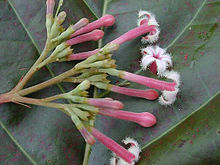Cinchona pubescens
Cinchona pubescens, the Quinine Tree, is known for because its bark has a lot of quinine.[1] It has similar uses to Cinchona officinalis in making quinine, used for treatment of malaria. [1] It is native to Costa Rica, Venezuela, Ecuador, Peru and Bolivia. In Ecuador, C. pubescens is found at altitudes from 300 to 3900 m above sea level. It grows to about 10 metres in height.[2] It has the widest distribution of all Cinchona species [2]
| Cinchona pubescens | |
|---|---|

| |
| Scientific classification | |
| Kingdom: | |
| (unranked): | |
| (unranked): | |
| (unranked): | |
| Order: | |
| Family: | |
| Genus: | Cinchona
|
| Binomial name | |
| Cinchona pubescens Vahl, 1790
| |
Planted on other tropical islands it has become an invasive species.[2] It grows quickly, and spreads by both seeds and root suckers. Other plants are unable to grow in the shade that it creates.[2] In the Galapagos Islands the tree was planted by farmers as a crop for the quinine.[2] It has become a dominant species on Santa Cruz Island, taking over from the shrub Miconia and Fern-Sedges. It is also invasive in Hawaii on Maui and the Big Island.[3]
Attempts have been made to control the plant in the Galapagos National Park using a variety of methods.[2] It is not affected by many poisons, it will regrow from a stump or any piece of root left in the ground.[2] Controlling it over all of Santa Cruz island would cost several million US dollars according to research by the Charles Darwin Foundation.
References
change- ↑ 1.0 1.1 "Medicinal Plants at the Missouri Botanical Garden". mobot.org. Retrieved 11 July 2010.
- ↑ 2.0 2.1 2.2 2.3 2.4 2.5 2.6 "issg Database: Ecology of Cinchona pubescens". issg.org. Archived from the original on 27 September 2007. Retrieved 11 July 2010.
- ↑ "Cinchona pubescens (PIER species info)". hear.org. Archived from the original on 12 August 2010. Retrieved 11 July 2010.